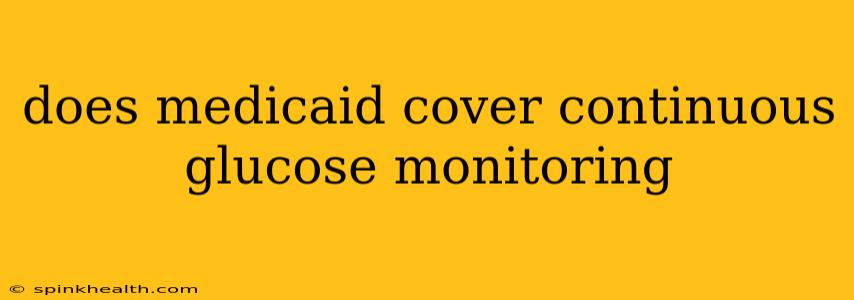Does Medicaid Cover Continuous Glucose Monitoring (CGM)? A Comprehensive Guide
The question of whether Medicaid covers continuous glucose monitoring (CGM) is a crucial one for millions of Americans living with diabetes. The answer, unfortunately, isn't a simple yes or no. It's a complex issue that depends on several factors, creating a journey filled with paperwork, phone calls, and sometimes, frustrating delays. Let's unravel this together.
My name is Sarah, and I've been navigating the world of diabetes and insurance coverage for over a decade. I've learned the hard way that understanding the intricacies of your health insurance is vital. This personal experience fuels my commitment to providing clear, accurate information.
The Short Answer: Medicaid can cover CGM, but it's not guaranteed. Coverage varies significantly depending on your state, your specific Medicaid plan, and your individual medical needs.
Now, let's dive into the details, addressing some of the common questions surrounding CGM and Medicaid coverage.
What factors determine Medicaid coverage for CGM?
This is the heart of the matter. Several interlocking factors influence whether your state's Medicaid program will approve CGM coverage.
-
State Medicaid Program Variations: Each state administers its own Medicaid program, resulting in considerable differences in coverage policies. Some states have more generous coverage for CGM than others. This means a successful application in one state doesn't guarantee success in another.
-
Your Specific Medicaid Plan: Even within a single state, different Medicaid managed care plans may have varying policies. Some plans might cover CGM for all eligible diabetics, while others may have stricter requirements.
-
Medical Necessity: This is usually the biggest hurdle. Your doctor must demonstrate the medical necessity of CGM for your specific case. This requires a thorough examination, a detailed medical history, and justification for why CGM is essential for managing your diabetes and preventing complications. Simple requests are rarely successful; a compelling case is necessary.
What documentation do I need to submit for CGM coverage under Medicaid?
Preparing a strong application is key. Gather the following:
-
Doctor's Prescription: A clear and specific prescription from your endocrinologist or primary care physician explicitly requesting CGM. This should detail why CGM is medically necessary for you.
-
Medical Records: Comprehensive medical records showing your diabetes diagnosis, treatment history, and any complications experienced. The more evidence you provide to support the medical necessity claim, the better.
-
Prior Authorization Forms: Most Medicaid plans require prior authorization before approving CGM coverage. This involves completing and submitting forms to your Medicaid plan. Don't hesitate to ask for help from your doctor's office or Medicaid's customer service.
What if my Medicaid application for CGM is denied?
Denial is unfortunately a common experience. Don't give up! Here's what you can do:
-
Appeal the Decision: Most Medicaid plans have an appeals process. Carefully review the denial letter and follow the instructions for filing an appeal. Include any additional documentation that strengthens your case.
-
Seek Assistance from Patient Advocacy Groups: Organizations dedicated to diabetes support can provide invaluable assistance in navigating the appeals process and advocating on your behalf.
-
Contact Your State Medicaid Office Directly: Don't hesitate to reach out to your state's Medicaid office for clarification and support.
What are the alternatives to CGM if Medicaid doesn't cover it?
If CGM coverage is denied, explore these alternatives:
-
Self-Monitoring of Blood Glucose (SMBG): This involves regularly checking your blood sugar levels using a finger-stick glucose meter. While less convenient than CGM, it remains an essential tool for diabetes management.
-
Financial Assistance Programs: Several organizations offer financial assistance to individuals with diabetes who struggle to afford CGM. Research and explore these resources diligently.
The journey to obtaining CGM coverage through Medicaid can be challenging, but persistence and thorough preparation are key. Remember, you have rights, and advocating for your health is crucial. Don't hesitate to reach out for help; there's a supportive community ready to assist you in this process. Your health is worth fighting for.

